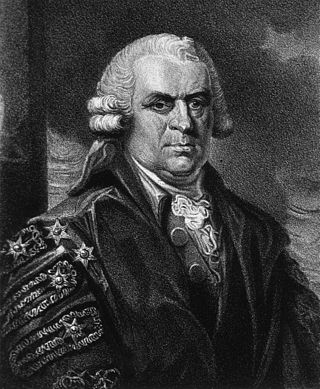Related Research Articles

Thomas Linacre or Lynaker was an English humanist scholar, Catholic priest, and physician, after whom Linacre College, Oxford, and Linacre House, a boys' boarding house at The King's School, Canterbury, were named.
Sir George Etherege was an English dramatist. He wrote the plays The Comical Revenge or, Love in a Tub in 1664, She Would If She Could in 1668, and The Man of Mode or, Sir Fopling Flutter in 1676.
Theophanes Chrysobalantes, erroneously known as Theophanes Nonnus or Nonnos in older scholarship, was a Byzantine physician who wrote an outline of medicine dedicated to Emperor Constantine VII Porphyrogennetos.

William Vincent was Dean of Westminster from 1802 to 1815.

Anthony Askew (1722–1774) was an English physician and is best known for having been a book collector. His collection was purchased by the British Museum and books purchased by George III of Great Britain were added to the King's Library.

John Parkhurst was an English Marian exile and from 1560 the Bishop of Norwich.
Edmund Dickinson or Dickenson (1624–1707) was an English royal physician and alchemist, author of a syncretic philosophical system.
Thomas Drant (c.1540–1578) was an English clergyman and poet. Work of his on prosody was known to Sir Philip Sidney and Edmund Spenser. He was in the intellectual court circle known as the 'Areopagus', and including, as well as Sidney, Edward Dyer, Gabriel Harvey, and Daniel Rogers. He translated Horace into English, taking a free line in consideration of the Roman poet's secular status; but he mentioned he found Horace harder than Homer. Drant's translation was the first complete one of the Satires in English, in fourteeners, but makes some radical changes of content.

Daniel Whistler (1619–1684) was an English physician.
Richard Forster (c.1546–1616) was an English physician.
Leonard Hutten (1557?–1632) was an English clergyman and antiquary.
Matthew Gwinne was an English physician.
Edward Grant was an English classical scholar, Latin poet, and headmaster of Westminster School. He was also the first biographer of Roger Ascham.
Richard Masters was a leading 16th-century English physician and personal doctor of Queen Elizabeth.
John Shepreve (1509?–1542) was an English classical scholar and Hebraist.

Sir George Baker, 1st Baronet, FRS, FSA was physician to King George III.
Richard Frewin, M.D. (c.1681–1761) was an English physician and professor of history.
Raphael Thorius M.D. was a London physician of Huguenot and Flemish background, known as a poet and humanist.
Thomas Moundeford M.D. (1550–1630) was an English academic and physician, President of the London College of Physicians for three periods.
Thomas Neal or Neale (1519–1590?) was an English churchman and academic, who became Regius Professor of Hebrew.
References
![]() This article incorporates text from a publication now in the public domain : Stephen, Leslie, ed. (1889). "Etherege, George (fl.1588)". Dictionary of National Biography . Vol. 18. London: Smith, Elder & Co.
This article incorporates text from a publication now in the public domain : Stephen, Leslie, ed. (1889). "Etherege, George (fl.1588)". Dictionary of National Biography . Vol. 18. London: Smith, Elder & Co.